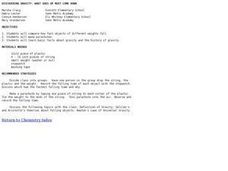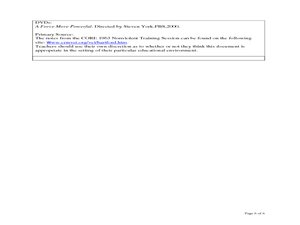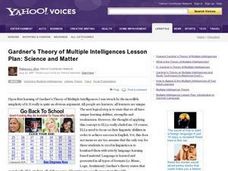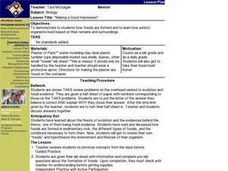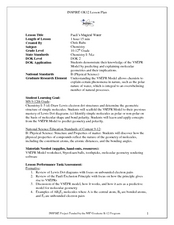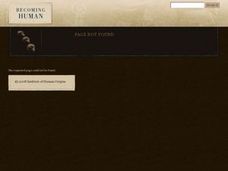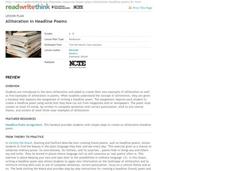Curated OER
The Mole
Young scholars investigate moles and Avogadro's hypothesis. In this moles lesson plan, students complete a worksheet by finding the volume of 1 mole of each substance given its density and they find the number of molecules, the formula,...
Curated OER
Discovering Gravity: What Goes Up Must Come Down
Students observe falling objects. In this lesson about gravity, students work in groups to determine how objects fall. Students determine speed of objects falling and whether weight is a factor. Students understand the concept of gravity.
Curated OER
ON BECOMING A NONVIOLENT WARRIOR
Students examine the concept of non-violent social change. In this instructional activity on social change, students research and role play to demonstrate ways in which this might be accomplished while making connections to various...
Curated OER
In Search of a Land Ethic
Students research the theory that everything is connected to everything else. Students explore the concept of how do we put normative values on our nonhuman environment. Students investigate an ecologist and write an informational...
Curated OER
Science and Matter: Multiple Intelligences
Students complete presentations of their understanding of the concept of matter in many different forms. In this matter lesson plan, students use whatever multiple intelligence they feel strongest in to present their presentation.
Curated OER
Burn, Baby Burn (Or Not)
Physics learners apply the concepts of fluid pressure input and output to firefighting. Divide your class into small groups and give them each a few cards that list nozzle type, hose length, hose size, and structure dimensions, They are...
Curated OER
Mass Measurement
Middle schoolers explore geometry by completing a physics activity on-line. For this mass measurement lesson, pupils define the terms mass, volume, and density and identify their relationship with each other. They complete an on-line...
Curated OER
"Making a Good Impression"
Students are shown how fossils are formed and to learn how extinct organisms lived based on their remains and surroundings. They are shown TAKS review problems on the overhead related to evolution and fossil evidence. Students discuss...
Curated OER
Why Don't Whales Have Legs?
Students are given a variety of materials and are asked to design a heat loss experiment that results in a reasonable explanation of "Why don't whales have legs?" students work with the theory of natural selection.
Curated OER
Pauli's Magical Water
Young scholars predict the shape of molecules using VSEPR theory. In this chemistry lesson, students differentiate a polar and nonpolar molecule. They discuss why water's polarity is very important.
Curated OER
Evolution
Young scholars investigate the concept of evolution and its implications upon the origin and development of life. They conduct research using a variety of resources while focusing upon cross-over and mutations. The information is used to...
Curated OER
Natural Selection and the Peppered Moth
Students study natural selection and its process in the peppered moth. In this evolution lesson, students read about the concept of natural selection as suggested by Charles Darwin. Students then complete a natural selection simulation...
Curated OER
Evolution: Adaptation
Tenth graders practice new skills and apply them. The skills of research should motivate them to want more knowledge. The concept of adaptation is used as a context for the lesson of practicing research skills.
Curated OER
Building Bodies
Students identify key anatomical similarities and differences between great apes and humans. They infer likely anatomical features in ancient human ancestors and list principal anatomical changes in primates necessary for adaptation to...
Curated OER
Learning from Light: The Big Bang
Students explore what astronomers are able to examine our galaxy and universe by examining light. They explore in this sub-unit the formation of the universe, commonly called "The Big Bang," and it follows studying from the Light: The...
Curated OER
The "Science" of Racism
How can we keep racism out of our society? Analyze the factors that lead to racism today and research previous scientific findings that impacted social policy. Your high school students identify ways to prevent past mistakes from...
Virginia Department of Education
Partial Pressure
At some point, everyone has been under pressure—even Dalton! Explore Dalton's law of partial pressures with young chemists as they measure the volume of air extracted from a sample compared to its original volume. Class members perform...
Curated OER
Plate Tectonics: Kindergarten Lesson Plans and Activities
This unit focuses primarily on plate tectonics and plate boundaries surrounding continents. It contains pre- and post-lab sections that walk young geologists through plate movements in order to visualize what's going on inside Earth.
NOAA
Plate Tectonics I
Young geologists get a glimpse beneath the earth's surface in this plate tectonics investigation. After first learning about the different layers of the earth and the constant movement of its plates, young geologists work in small groups...
ReadWriteThink
Alliteration in Headline Poems
Poetry is everywhere you look! Create found poems using headlines from newspapers and magazines. Young poetry focus on creating alliterative phrases with words they find in headlines, tying their poems to a central theme.
Kenan
Respiratory System
Explore the respiratory system with a model. First, pupils build a set of lungs to experiment how they inflate and deflate. Then, they delve deeper into the topic with a web quest to discover new information about the nose, trachea, and...
Teach With Movies
Learning Guide to: Schindler's List
Take your history class through Schindler's List with a learning guide, which offers an introduction to the film and a variety of discussion questions and related assignments. There are several useful resources in the sidebar, such as a...
National Council of Teachers of Mathematics
The Game of SKUNK
Do I stand or do I sit? The class plays a dice game where they must decide to either continue to stand and play or sit down and keep their points. After the game, groups discuss individuals' strategies and see connections to the...
National Gallery of Canada
My First Print
Practice printmaking with a fun lesson. After observing images, class members use the listed materials, such as stamps and sponges, create their own prints. They experiment with layering, pressure, and paint colors.



